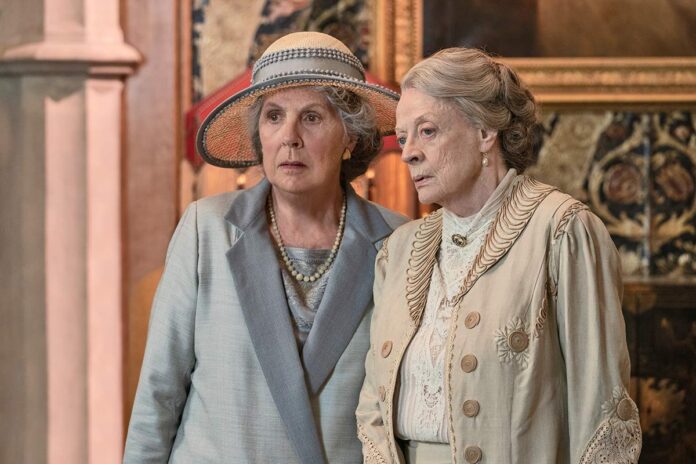
Lord and Lady, welcome back to Downton Abbey, where everything new is old again. Alas, fans of the series and subsequent film who have been eagerly awaiting the return that is “Downton Abbey: A New Era,” may be disappointed by this latest installment opening May 20 in theaters. Yes, it is good to see the familiar characters, from Dowager Countess Violet Grantham (the estimable Maggie Smith) down to Daisy (Sophie McShera), one of the kitchen maids. But while the world has changed — it is now 1929 — most of this film feels predictable, and, in this case, familiarity may breed viewers’ contempt.
The problem is that the plot is as dull as unpolished silver. Screenwriter Julian Fellowes, who created the original series, may be able to juggle storylines for more than two dozen characters, but he does not give many of them anything interesting to do. (Don’t worry about needing a scorecard to keep track of folks or their histories; anything of importance from the past is covered in the expository dialogue.)
Two main narratives drive this not very special big screen episode. One involves the late Marquis de Montmiral willing the Dowager Countess Violet Grantham his villa in the South of France. (Maybe that’s where she learned how to deliver her bon mots?) The acquisition of this property, however, causes considerable discussion and hullabaloo about the reason why this unexpected inheritance was bequeathed to her.
Given the Dowager Countess’ failing health, her son, Robert (Hugh Bonneville) and his wife Cora (Elizabeth McGovern), along with Tom Branson (Allen Leech) and his new wife, Lucy Smith (Tuppence Middleton) — his child from his former marriage is getting the estate — are dispatched with others to the French Riviera. Also along is Mr. Carson (Jim Carter), the retired, but still steadfast butler. He gets seasick on the boat in the film’s idea of gentle — or is it genteel? — humor. (Whichever it is, it is more strained than amusing.)
Once in France, everyone frets that the Dowager Countess may have had relations with The Marquis and that Robert is — gasp! — not his father’s child. It’s just too much for Robert to bear and Bonneville’s crying at the thought of being an “imposter” does stir up emotion — and that emotion is unintentional snickering.
The other storyline is equally absurd. A movie company, British Lion, wants to film their silent motion picture, “The Gambler,” at Downton Abbey, and they will pay handsomely for this privilege. Some folks look down upon actors as “common,” but given the money needed to fix the leaky roof, it is an easy decision. Daisy is thrilled, starstruck by the opportunity of having the glamorous film star Myrna Dalgleish (Laura Haddock) and the swoon-inducing Guy Dexter (Dominic West) staying at Downton Abbey. But Myrna is rude, demanding, and unpleasant, and Guy is more interested in spending time with head butler, Thomas Barrow (Robert James-Collier), who lest anyone forget, is gay. (A letter delivered to Barrow explains that the man he loved in the last film has opted to get married; Barrow, however, proudly takes the risk of living his truth.)
The possible romance between Guy and Barrow percolates with sexual tension, but “Downton Abbey: A New Era” pays far more attention to a ridiculous romantic subplot featuring the director of “The Gambler,” Jack Barber (Hugh Dancy), cozying up to Lady Mary (Michelle Dockery) who helps him out in several ways with filming. (Hint, the talkies are becoming popular, and Myrna’s voice is as unbearable as her manners.) Jack falls for Lady Mary — her husband is conveniently away — but he is politely rebuffed; it just is not proper. (These scenes also lack passion and credibility in addition to being uncouth.)
Director Simon Curtis lazily telegraphs so much of the action that viewers may wish “Downton Abbey: A New Era” was a silent film to just marvel at the fabulous costumes and exquisite interiors, but not have to endure the predictable dialogue. When a character says, “You look tired,” it is a cue to call the doctor. A fancy party in the Riviera lacks joie de vivre. Part of the appeal of the series is to live vicariously through watching these beautiful rich people live and eat well, but the pleasures of armchair travel back in time and through these tastefully appointed rooms seems a wasted effort here.
There are a few bright spots including Mr. Carson buying a hat in France and having an encounter with Maud Bagshaw (Imelda Staunton) to Joseph Molesley (Kevin Doyle) proposing to his beloved, unaware that he is on a hot mic. It is corny, but so much of “Downton Abbey: A New Era” goes for the mediocre instead of the sophisticated that viewers will feast on whatever crumbs there are.
Watching Guy and Barrow dancing around what kind of relationship they might have together is one of this lackluster film’s highlights. And while — spoiler alert — the two men do not even kiss, the debonair Dominic West provides the film with its only real verve. Laura Haddock’s shrill Myrna Dalgleish is painfully one note until her expected comeuppance is delivered, naturally, by her biggest fan. (That’s not a spoiler. Everyone can see that coming.)
Maggie Smith is, as always, wonderful as the Dowager Countess, but the material does not ask her or the large ensemble cast to do much more than go through the motions.
Nevertheless, fans will find it all hard to resist, even if “Downton Abbey: A New Era” is, sadly, a bit of flat champagne.